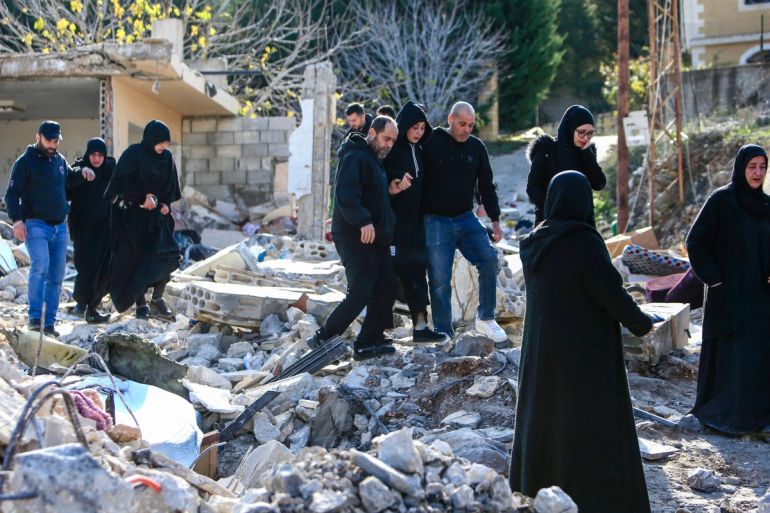Israeli military strikes south Lebanon stoking fears of widening conflict
Attacks on Hezbollah military infrastructure follow the killing of Hamas leader in Beirut, which Israel has not claimed.

Several Hezbollah members have been killed in Israeli strikes on southern Lebanon in one of the deadliest days for the Iran-aligned group as cross-border fighting has escalated since the start of the Gaza war in October.
At least nine members of the group were killed in separate attacks on Wednesday, the Reuters news agency reported.
Keep reading
list of 3 itemsThe Take: Are Hezbollah and Israel close to an all-out war?
Hezbollah chief says group won’t ‘be silent’ after killing of Hamas leader
The Israeli military released nighttime videos of the attacks, including those on Hezbollah military infrastructure and “observation devices” in the village of Yaroun in southern Lebanon’s Nabatieh governorate, located across the border from the Israeli settlements of Yir’on and Avivim in northern Israel.
The grainy footage appears to show Israeli bombs hitting and destroying several residential buildings near other civilian buildings.
“Launches” were also detected crossing Lebanese territory that fell in open areas in northern Israel’s Goren settlement area, the Israeli military said.
Since October 8, continuing clashes at the border between the Israeli army and Hezbollah have resulted in the deaths of dozens of Lebanese civilians and more than 140 Hezbollah members. Israel and armed groups in southern Lebanon – some 200km (124 miles) from the Gaza Strip, particularly Hezbollah, have engaged in frequent back-and-forth exchanges across the United Nations-patrolled Israel-Lebanon border.
Fears of escalation
The attacks followed the killing of Saleh al-Arouri, a deputy leader of Hamas, in a drone strike in the Lebanese capital, Beirut, on Tuesday.
Hezbollah chief Sayyed Hassan Nasrallah said in a televised speech on Wednesday that the killing of al-Arouri was “a major, dangerous crime about which we cannot be silent”. Hezbollah supports the Palestinian armed group.
Thousands attended al-Arouri’s funeral in Beirut later on Thursday, where mourners prayers before carrying his body to the Palestine Martyrs Cemetery in the Shatila refugee camp.
The funeral was attended by Palestinian officials, including top Hamas official Moussa Abu Marzouk, as well as representatives of some Lebanese political groups.
Al Jazeera’s Imran Khan, reporting from Beirut on Thursday, said all of the various Palestinian factions in Lebanon “came out in force”.
Members of Hezbollah joined them as well, Khan said. All of the senior Hamas leadership in Lebanon also attended the funeral, he added.
“That was a real sign of respect, that was a real sign of unity,” Khan said. “Today, wasn’t about revenge … today was about showing defiance and unity.”
Both Hamas and Hezbollah are expected to react, Khan said.
He said that the language coming from both Israel and Hezbollah suggests that neither side is willing to back down.
Nasrallah blamed Israel for the attack and offered his condolences to Hamas for what he called a “flagrant Israeli aggression”.
Israel has not taken responsibility for the attack that killed al-Arouri in the southern Beirut suburb of Dahiyeh, a Hezbollah stronghold. But there are growing concerns that Israel’s war in Gaza is escalating across the region.
The United Nations called for restraint, saying a further uptick in hostilities could be devastating for both Israel and Lebanon.
French President Emmanuel Macron, in a call with Israeli war cabinet member Benny Gantz, urged Israel to “avoid any escalatory attitude, particularly in Lebanon”.
Israeli Prime Minister Benjamin Netanyahu previously warned that Beirut would be turned “into Gaza” if Hezbollah started an all-out war.